In the article “Health Care and Equality of Opportunity”, author Gopel Sreenivasan posits that the argument that ones’ right to health suggests that they should have access to healthcare, is flawed; equal opportunity does not require universal access to healthcare. In one supporting argument he uses to defend his thesis, Sreenivasan argues that even if access to health care is held constant, socioeconomic status seems to strongly contribute to the distribution of health (Sreenivasan, 24). This suggests that universal healthcare may not be the solution to the problem of health, but rather, other social determinants may greatly influence health and we need to look deeper into these other issues and try to come up with other solutions to the problem of health. In the Whitehall study, mortality rates and cardiovascular prevalence were investigated in British men ranging from ages 20 to 64. All of the subjects were stably employed, lived in the same region of greater London, and had free access to health care provided by the NHS. The subjects were divided into 4 cohorts as defined by the British Civil Service: administrative, professional/executive, clerical, and “other” (Sreenivasan, 24). The interesting findings in this study showed that after nine years, clerical civil servants had significantly lower mortality rates than the “others”, and the mortality rate for professionals is more than a third lower than that for clericals. Following the trend, the mortality rate for administrators was in turn a third lower than that for professionals (Sreenivasan, 24). The results strongly support the idea that socioeconomic status makes a contribution to the distribution of health.
Energy should be devoted to improving the social determinants of health and not so much emphasis should be placed on universal healthcare. Yes, access to healthcare is very important, however, there are other factors including race, gender, and social status that prove to be problems of fair opportunity (Beauchamp, 264). The ethical principle of justice is the underlying issue in Sreenivisans’ article. Justice in this case is referring to the equitable allocation of health. Unfortunately, not everyone is treated the same. For example, minorities, women, and the poor, all have significantly compromised health in comparison to their counterparts. Social factors thus prove to have negative effects on health, and if justice were being served on the race, ethnicity, and social status levels, disparities in healthcare would cease to exist.
I believe it is important to understand why these health disparities even exist. Unequal access to quality health care is one very important one. But there are other important factors, including education, and living and work environments. Race and income are also often correlated to important health risk factors, like smoking, being less active, and obesity. To me, equal opportunity looks like placing Whole Foods supermarkets in neighborhoods where there are food deserts, limiting the amount of alcohol stores in poorer neighborhoods, and having access to great public schools. I believe these will definitely help to diminish health disparities and they serve a greater purpose than simply providing equal access to healthcare.
Works Cited
Sreenivasan, Gopal. “Health Care and Equality of Opportunity.” Hastings Center Report 37.2 (2007): 21-31. Web.
Beauchamp, Tom L., and James F. Childress. Principles of Biomedical Ethics. New York, NY: Oxford UP, 2001. Print.

